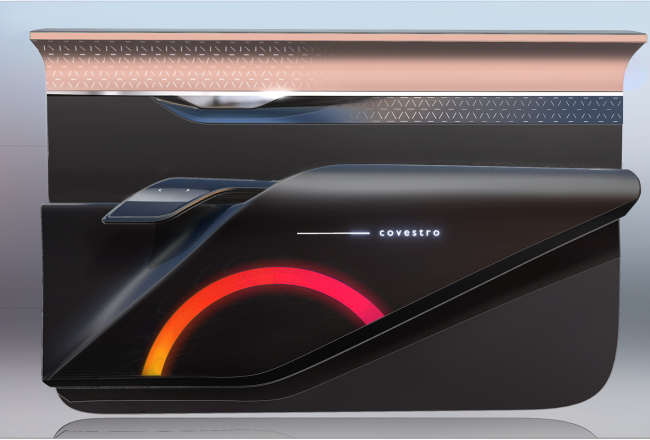
New solutions for more sustainable automotive trim parts
Blending durability and enhanced sustainability for the premium look and a memorable passenger experience
Automotive OEMs and their suppliers continue to seek material solutions that offer future-oriented and more sustainable properties, without compromising on performance or quality of interior trim parts. New solutions should also generate savings in processing costs.
Together with the designer Miika Heikkinen, material experts from various business entities within Covestro joined forces to combine innovative materials for new design possibilities that match automotive trends. The result was a door panel combining several functionalities.
INSQIN® technology delivers a premium surfaces reminiscent of genuine leather. In combination with Dispercoll® CQ U, it opens new design possibilities with a range of colors and dynamic transparent and translucent effects while offering high indoor air quality.
Reduced emissions and cost-effective applications for high-quality interiors
Thanks to our water-based INSQIN® polyurethane (PU) coating technology in combination with an adhesive based on Dispercoll® CQ U dispersions, we were able to create translucent optical properties, coating adhesion and deep color effects in door panel covers. These covers enable hidden or on-demand functionalities as well as special, varying lighting effects.
These two aqueous, low-VOC solutions were developed specifically to present cost-effective and more sustainable applications for the future requirements of car interiors while offering a nearly odorless indoor air quality.
Furthermore, our water-based polyurethane dispersions are also available based on renewable raw materials, thereby further reducing the CO₂ footprint of the respective coating or adhesive formulation. As a (near) drop-in solution, they can be easily integrated in existing formulations without disrupting the production process.
Formulations to improve the CO₂ balance and the more sustainable production of low VOC materials
The CO₂ balance can be further improved using Impranil® CQ DLU which consists of approximately 34 wt. % renewable carbon.*
For waterbased adhesives, we offer with our Dispercoll® CQ U grades as a drop-in solution with an alternative share of up to 85 wt. % on solids.**
The Impranil® and the Dispercoll® U product ranges with their high-performance, waterborne dispersions are an excellent choice for more sustainable processes, especially since they are well suited for the production of low VOC synthetic materials.
Another application for improving the CO₂ balance involves a partly bio-based waterborne soft-touch coating with up to 33% renewable carbon in the final formulation.*
*expressed as fraction of total carbon content, calculated internally and analytically verified through external C14 measurement
**ISCC PLUS certified material attributed via mass balance, expressed as fraction of total mass (delivery form)
As a recognized global leader in design services, we strive to take a future-driven, holistic approach that meets tomorrow’s realities as well as placing end user needs at the heart of our designs. This concept door panel shows how material technologies can open up new future-oriented designs that are not only more sustainable but also bring added value for consumers by simplifying interiors to make them calmer and more purposeful, resulting in truly seamless journeys.
Key Benefits
- Low-VOC solutions: Compliant with current VOC guidelines and enable high indoor air quality.
- Design freedom: The combination of INSQIN® and Dispercoll® CQ U enables a wide range of translucent and transparent design effects for automotive interior trims.
- Alternative raw materials: Partially bio-based Impranil® CQ and bio-circular attributed Dispercoll® CQ U product ranges can further reduce the CO₂ footprint.*











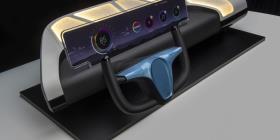
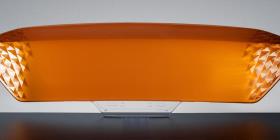
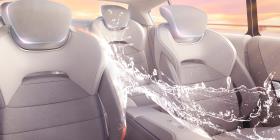
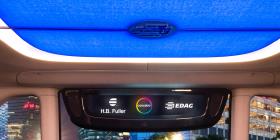

.jpg?h=140&w=280&rev=2dcf54ed863846369dcdc0377739db34&hash=51A4E10281F6D8A88FCE6C619EF38D50&usecustomfunctions=1¢ercrop=1)
